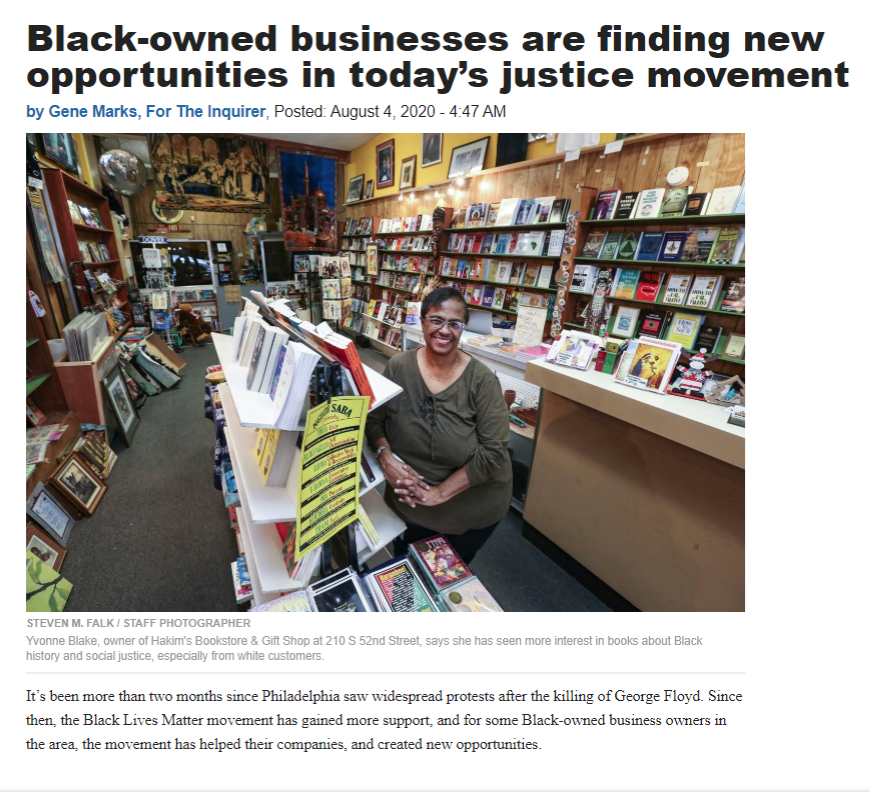Philadelphia Inquirer Interview About Black-Owned Business
August 4, 2020

Last month, President Karla Trotman was sent interview questions for an article that was to appear in the Philadelphia Inquirer about Black-owned businesses finding new opportunities during this current iteration of the racial justice movement. While most of her questions did not appear in the article, one of the quotes was cut and didn’t fully embody the spirit of what she wanted to be relayed. The entire interview is posted below.

Do you have any reservations or concerns emphasizing your race when marketing your business – is it an advantage or disadvantage?
My company has been in business for 34 years. In the past, we would never post the fact that we were a Black-owned business. History has taught us that it can be a liability. We’ve found that walking in the supplier diversity door of some companies comes with additional hurdles. The biggest one being bias where companies must prove that they can, in fact, do the work. Especially in our business of advanced manufacturing and electronics. We are now in a fortunate position. Our work now stands on its own, however, we do not highlight Black-ownership, nor do we hide it.
Do you use any unique sites, tools or services oriented to Black-owned businesses (i.e. https://fivefifths.co/) to help market your business?
No. We are in a unique position because as a B2B supplier of electronics manufacturing services there aren’t many minority players at our level due to the high barriers to entry. When people come to us, they come for our expertise. On the backend, however, some companies are happy to learn that they are able to meet their diverse supplier spend targets by working with us.
How has the BLM movement made a difference for your business so far? Has it?
The BLM Movement has made zero difference for my business because the average consumer does not buy industrial electronics manufacturing services. I think more of a difference has been made for B2C businesses. However, separate and distinct from BLM, the COVID crisis has highlighted the deficiencies in many companies’ global supply chains and they are realizing that they need stateside manufacturing services. At the same time, these companies are putting out BLM statements without even having an internal D&I focus or a supplier diversity plan. My hope is that these companies will extend their stateside search to include minority-owned businesses as a part of a larger strategy that includes making a concerted effort to identify and engage in doing business with black-owned entities.
How do you think the current BLM movement will have a long term impact on your business?
It is my hope that companies will seek out and make concerted efforts to diversify their supplier base. Black businesses are least likely to receive financing for our businesses when compared to our white counterparts. Black businesses’ cost of capital tends to have a larger negative impact in comparison to their white counterparts. B2B companies can SHOW how black lives matter by supporting black businesses, not through handouts, but by simply DOING BUSINESS with black businesses. If they are willing to make that connection, there will definitely be a long term impact.
How has the BLM movement changed the way you market your business?
There has been zero change.
What advice do you have for other Black business owners who are looking to capitalize on BLM and grow their companies?
I hesitate to use the word “capitalize” in this instance. George Floyd’s life will forever be connected to this current iteration of the BLM movement. It was the tipping point that caused a massive and collective cross-cultural outrage. It caused people to look at systemic racism and how something like economic empowerment is just one spoke on the wheel of change.
Remember, black business owners are still having issues with obtaining CARES Act funding to keep their businesses alive. 40% of all black businesses will fail during this crisis due to a lack of capital. Many black businesses are looking for lifelines in order to just sustain the downturn.
